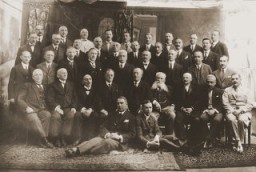You searched for: austria
<< Previous | Displaying results 421-430 of 505 for "austria" | Next >>
-
Charles Torluccio describes liberation and the role of medical staff
Oral HistoryCharles Torluccio is a veteran of the 11th Armored Division. During the invasion of German-held Austria, in May 1945 the 11th Armored (the "Thunderbolt" division) overran two of the largest Nazi concentration camps in the country: Mauthausen and Gusen.
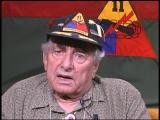
-
Darrell Romjue describes how US troops encoutered camps such as Mauthausen
Oral HistoryDarrell Romjue is a veteran of the 11th Armored Division. During the invasion of German-held Austria, in May 1945 the 11th Armored (the "Thunderbolt" division) overran two of the largest Nazi concentration camps in the country: Mauthausen and Gusen.
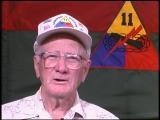
-
Sophie Turner-Zaretsky describes her transition to living in London
Oral HistorySophie was born Selma Schwarzwald to parents Daniel and Laura in the industrial city of Lvov, two years before Germany invaded Poland. Daniel was a successful businessman who exported timber and Laura had studied economics. The Germans occupied Lvov in 1941. After her father's disappearance on her fifth birthday in 1941, Sophie and her mother procured false names and papers and moved to a small town called Busko-Zdroj. They became practicing Catholics to hide their identities. Sophie gradually forgot that…
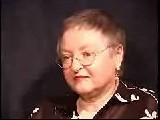
-
Leo Schneiderman describes conditions in the Lodz ghetto
Oral HistoryThe Germans invaded Poland in September 1939. Leo and his family were confined to a ghetto in Lodz. Leo was forced to work as a tailor in a uniform factory. The Lodz ghetto was liquidated in 1944, and Leo was deported to Auschwitz. He was then sent to the Gross-Rosen camp system for forced labor. As the Soviet army advanced, the prisoners were transferred to the Ebensee camp in Austria. The Ebensee camp was liberated in 1945.
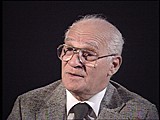
-
Hana Mueller Bruml recalls the occupation of Prague
Oral HistoryIn 1942, Hana was confined with other Jews to the Theresienstadt ghetto, where she worked as a nurse. There, amid epidemics and poverty, residents held operas, debates, and poetry readings. In 1944, she was deported to Auschwitz. After a month there, she was sent to Sackisch, a Gross-Rosen subcamp, where she made airplane parts at forced labor. She was liberated in May 1945.
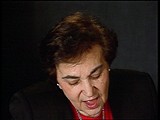
-
Franz Wohlfahrt describes the trial and sentencing of his father
Oral HistoryFranz and his family were Jehovah's Witnesses. Germany annexed Austria in 1938. After World War II began, Franz's father was executed because, as a Witness, he opposed war. In 1940, Franz refused to participate in military training and would not salute the Nazi flag. He was imprisoned, interrogated by the Gestapo (German Secret State Police) in Graz, and sentenced to five years of hard labor in a camp in Germany. Franz was liberated by US forces in 1945.
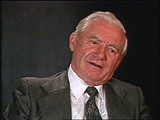
-
Franz Wohlfahrt describes imprisonment in Graz
Oral HistoryFranz and his family were Jehovah's Witnesses. Germany annexed Austria in 1938. After World War II began, Franz's father was executed because, as a Witness, he opposed war. In 1940, Franz refused to participate in military training and would not salute the Nazi flag. He was imprisoned, interrogated by the Gestapo (German Secret State Police) in Graz, and sentenced to five years of hard labor in a camp in Germany. Franz was liberated by US forces in 1945.
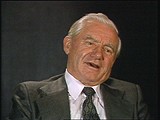
-
Hans Heimann describes internment in Italy
Oral HistoryThe Germans annexed Austria in March 1938. In 1939, Hans fled first to Hungary and then to Italy. He and his parents were interned in various towns. Hans's father became ill and died in 1940. In 1943, Hans and his mother were warned of German plans to deport Jews from Italy to Poland. They moved to smaller towns until liberation by the British in August 1943. Hans worked as an interpreter for the Allies until 1945, when he worked for the American Jewish Joint Distribution Committee and helped resettle…
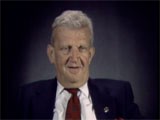
-
The Treatment of Soviet POWs: Starvation, Disease, and Shootings, June 1941–January 1942
ArticleThe Nazi treatment of Soviet prisoners of war (POWs) was determined by Nazi ideology. Cruel conditions included starvation, no medical care, and death.
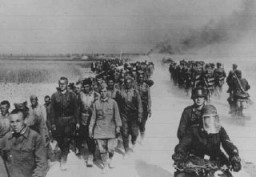
-
Freemasonry
ArticleAdolf Hitler repeated the pre-existing claim that Jews used Freemasonry to achieve their political ends. Learn more about the history of Freemasonry.
